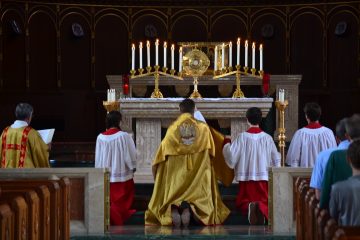Sunday Scripture: Blessed are those who have not seen and have believed
April 30, 2011
By Terrance Callan
Second Sunday of Easter: Acts 2:42-47; 1 Peter 1:3-9; John 20:19-31.
How can we believe in Jesus? What is the foundation of our faith in him? How does that faith make a difference in our lives?
This Sunday’s reading from the Gospel according to John ends by saying that what the Gospel narrates was written “that you may come to believe that Jesus is the Christ, the Son of God.”
The reading tells how Jesus appeared to His disciples after His resurrection and implies that they believed in Jesus as a result. Thomas was not present when Jesus appeared and refused to believe when the others told him they had seen Jesus. So Jesus appeared a second time, when Thomas was present, and Thomas believed.
He said to Jesus, “My Lord and my God!” In reply Jesus said to Thomas, “Have you come to believe because you have seen me? Blessed are those who have not seen and have believed.”
Jesus’ resurrection is the source of faith not only for the first disciples who saw Him after His resurrection, but also for us who have only heard about it. Jesus blesses those who believe without seeing, something Thomas would not do.
The reading from the First Letter of Peter is a prayer of praise that begins the letter. The prayer praises God for giving us faith through the resurrection of Jesus. This faith is a “new birth,” the beginning of a new life. Believing in Jesus is like being born again as children of God. And as children of God, we are God’s heirs. We do not yet experience the fullness of this new life; we “may have to suffer through various trials.” But when Jesus appears again, we will receive “an inheritance that is imperishable, undefiled, and unfading, kept in heaven” for us. The believers addressed by the First Letter of Peter are not people who have seen Jesus risen. Like us, they have believed without seeing.
The reading ends: “Although you have not seen Him, you love Him; even though you do not see Him now yet believe in Him, you rejoice with an indescribable and glorious joy, as you attain the goal of your faith, the salvation of your souls.”
The reading from the Acts of the Apostles shows what a life shaped by faith looks like. And it suggests that simply living such a life is one way to accomplish our mission of continuing Jesus’ work. The reading says that the early church in Jerusalem “devoted themselves to the teaching of the apostles and to the communal life, to the breaking of bread and to the prayers.”
These are the features of a life shaped by faith. It is a life lived under the leadership of the apostles. And it is a life in community, in which believers pray and break bread together. The early Jerusalem church lived a common life to such an extent that they “had all things in common; they would sell their property and possessions, and divide them among all according to each one’s need.”
The New Testament makes it clear that believing in Jesus does not necessarily imply sharing all things in common. But such a life is a powerful witness to the presence of God. In the early days of the church in Jerusalem this way of life won the approval of the other residents of Jerusalem. And this in turn fostered the growth of the church that is the means by which it continued the work of Jesus.
Whatever are the particular ways that faith shapes our lives, it is principally through the shape of our lives that most of us will carry out our mission to continue the work of Jesus in the world, or fail to do so.
Callan is a faculty member at the Athenaeum of Ohio.









